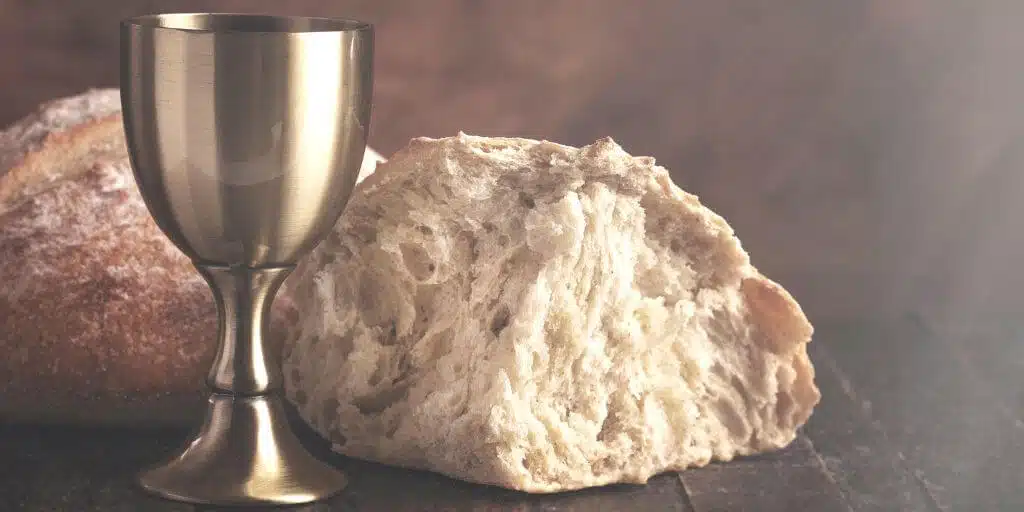In Remembrance of Me

The Lord Jesus… took the bread, and when he had given thanks, he broke it and said, “This is my body, which is for you; do this in remembrance of me.” In the same way, after supper he took the cup, saying, “This cup is the new covenant in my blood; do this, whenever you drink it, in remembrance of me.” (1 Corinthians 11:23-25)
We are all familiar with these words from the New Testament. Your church may celebrate the Lord’s Supper (also called the Lord’s Table, Communion, or Eucharist, etc.) on a fairly regular basis. But what is really happening during this event? Throughout history three major views have emerged as to what is really taking place.
- Roman Catholics are taught that during the rite the bread and wine are transformed into the actual body and blood of Jesus. This is known as transubstantiation. You are quite literally eating Jesus’ body and drinking His blood.
- The Lutheran tradition holds that while the bread and the wine remain unchanged in nature, nevertheless, Christ is present in some way, so again, you are literally eating and drinking Christ’s body and blood. This may be called consubstantiation.
- The third view, held by the majority of Protestants, is that this is merely a memorial service, meant to remind you of the great and finished sacrifice of Christ on your behalf.
The problem many theologians have with the transubstantiation view is that participants believe this represents a continual re-sacrifice of Christ for the sins of men. They are eating the “actual” body and drinking the “actual” blood of Christ. This view led some early critics of Christianity to accuse the church of practicing cannibalism.
According to Paul Little, transubstantiation is “a view that assumes that the body and blood of Christ are offered every time the mass is observed. Scripture, however, emphatically contradicts such ideas. Christ’s death on the cross was a complete and fully effective sacrifice, and he died once for all (Hebrews 10:10; 7:27; 9:12).”
- Hebrews 10:10 – “we have been made holy through the sacrifice of the body of Jesus Christ once for all.”
- Hebrews 7:27 – Unlike the other high priests, he does not need to offer sacrifices day after day, first for his own sins, and then for the sins of the people. He sacrificed for their sins once for all when he offered himself.
- Hebrews 9:12 – He did not enter by means of the blood of goats and calves; but he entered the Most Holy Place once for all by his own blood, thus obtaining eternal redemption.
So, no need to offer Jesus’ body and blood again and again and again. No need to believe that the body and blood of Jesus are actually present in the bread and wine, even if the elements themselves remain unchanged.
On the other hand, the memorial view stands scriptural scrutiny. First, the very words themselves in Scripture: “in remembrance of me.” The word translated “remembrance” is anamnesis, meaning “a remembering, recollection.”
J.I. Packer explains: “Jesus’ sermon (John 6:35-58) about himself as the Bread of Life, and the need to feed on him by eating his flesh and drinking his blood, was preached before the Supper existed and is better understood as being about what the Supper signifies (i.e., communion with Christ by faith) than about the Supper itself.”[1]
He goes on to say:
“[A]ll the Reformers insisted that at the table we give thanks to Christ for his finished and accepted work of atonement, rather than repeat, renew, reoffer, re-present, or reactivate it, as the Roman Catholic doctrine of the mass affirms.
“The prescribed ritual of the Supper has three levels of meaning for participants. First, it has a past reference to Christ’s death which we remember. Second, it has a present reference to our corporate feeding on him by faith, with implications for how we treat our fellow believers (1 Cor. 11:20-22). Third, it has a future reference as we look ahead to Christ’s return and are encouraged by the thought of it.”[2]
Finally, Lewis Chafer and John Walvoord say this:
“The Lord’s Supper has been rightly regarded by many Christians as a sacred time of commemoration of the death of Christ and all its meaning for the individual Christian. As indicated by Paul, it is a time of heart-searching, a time of confession of sin, and a time of restoration. It is also a reminder of the wonderful benefits which have come to every Christian through the death of Christ.”[3]
So next time you come to the table to celebrate communion, use that time to remember, to thank God for the incredible gift He has given you. Use that time to confess and turn from your sins. Use that time to remind yourself to live obediently in gratitude for your salvation.
Go Deeper






Thank you for showing Catholic and
Lutheran ideas. I am Protestant .
Do this in remembrance of me…..